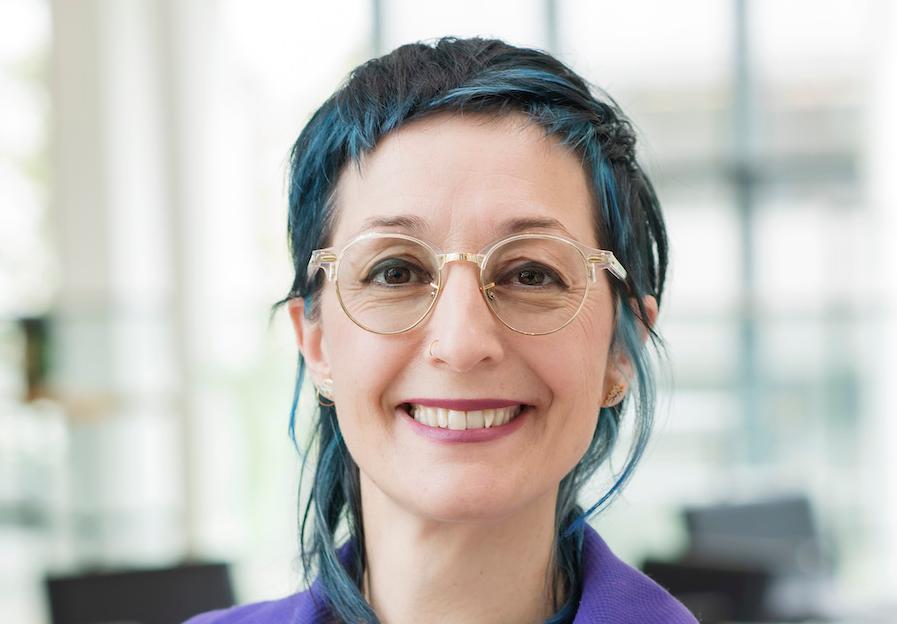Virtual reality “extremely successful” at distracting children during hospital procedures
Thursday, 28 September, 2023
Listen to the (opens in a new window)podcast
Dr Marina Everri is Assistant Professor at the School of Medicine in University College Dublin. Here she speaks about her project Cyborg Children, which examines the role of digital technologies in childhood development.

Every time a new piece of technology comes to market, there is concern and debate about how it might be unsuitable for children.
“Instead of focusing on what is bad and what is good, I think it's important to look at what is useful and what is not useful for child development,” says social psychologist and clinical practitioner, Dr Marina Everri. “Virtual reality (VR) can be very useful.”
VR is a computer-generated environment with scenes and objects that appear to be real, making the user feel they are immersed in their surroundings.
For children in hospital, distressed at having to undergo a painful procedure, like getting a cannula, a drip or stitches, VR headsets are increasingly being used as distraction devices.
“Over the last fifteen years, we have seen a lot of research looking at the potential of virtual reality for different types of clinical intervention,” says Dr Everri. “For instance, to distract children from pain in particular procedures in hospitals. That has been extremely successful because they're very immersed in a virtual environment. When we are immersed in virtual environments our brain treats that environment as if it is a real, physical environment, so we forget about other things, like pain or negativity.”
The Royal London Hospital is just one of several that uses VR in its paediatric emergency department, with a study showing it enables relaxation and increases happiness in a hospital setting, among other benefits.
"When we are immersed in virtual environments our brain treats that environment as if it is a real, physical environment, so we forget about other things, like pain or negativity.”
VR has also been shown to enhance some learning and communication skills for children with ADHD and autism, says Dr Everri. But, like any technology, it can also be misused.
“The risk is that because virtual reality involves full immersion, if children are exposed to negative content in the virtual world, this can be very disturbing.”
Parents and educators have understandable concerns, too, about any negative online content children might potentially access via their phones, tablets and computers.
Debates abound over how much ‘screen time’ children should have and whether spending time online limits their social skills or compromises their physical and emotional health.
But Dr Everri thinks such blanket dangers may be overstated.
“I think the media has created what I call moral panic surrounding screen time, but it isn't something new. When I was a child, in the late 80s, there was a lot of concern about spending time in front of the TV. But psychosocial research has not provided evidence about a direct relationship between the amount of time spent watching any kind of content and particular problems, behaviour or social and emotional problems.”
“I think the media has created what I call moral panic surrounding screen time, but it isn't something new."
She points out that research also shows that banning screen time doesn’t work. We need to focus instead on what Dr Everri calls “content and context”, supervising what children are accessing online and doing our best to ensure that their lives, on the whole, are secure and happy.
“Do they have particular vulnerabilities? What are their peer and family relationships like? We need a more complex view of children's backgrounds before drawing the conclusion that technologies have a negative impact on their social and emotional development.”
Of course, the internet is bursting at the seams with what Dr Everri calls “risky” content. How can we ensure children access technology as safely as possible?
“That’s a key question. Schools and families, parents and teachers should work together to develop good practices for the use of digital technologies. There are already projects in place in which parents and schools agree on what are called ‘digital pacts’,” she adds, giving the example of how the parents’ associations of eight primary schools in Greystones, Wicklow, joined forces earlier this year to collectively ban smartphones until secondary school.
“It is important to develop connections between parents and teachers, families and schools. But there is also something that needs to be done at a macro level in terms of improving regulations around children’s access to digital technologies.”
Dr Everri received Irish Research Council funding for a project assessing the digital skills and wellbeing of over 700 school children aged ten and eleven across Ireland and Italy.
“This is the age in which they start getting their smartphones and become very curious about the online world,” she explains.
“What we found is that children in that age range already have good technical skills; they know how to open an account to download an application. What they need to learn is how to behave online.”
For instance, very few children who were cyberbullied knew what to do about it. Dr Everri says schools and parents need to realise that children need guidance in honing their social skills along with their technical skills online.
“When we socialise our children to the school context, we teach them how to behave with their peers and how to behave with their teachers. So it's important that we do the same for the virtual world, for the digital world. Parents don't need to become tech savvy, that's not their role. They don't need to be engineers, they don't need to be computer scientists. But they need to be there for their children and continue to have their role as educators as parents.”
Listen to the (opens in a new window)podcast.